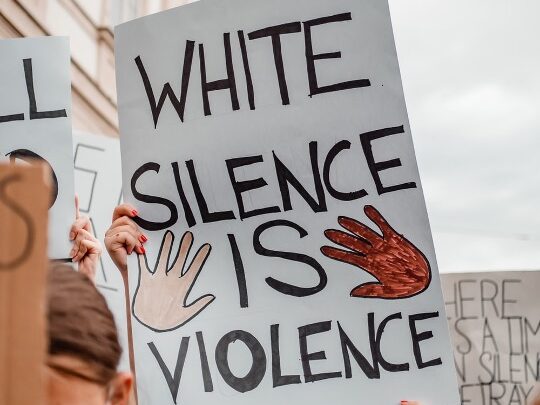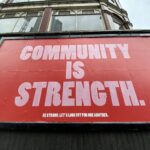Editor’s Note: This is the second in a two-part series by Adar Ayira, Last week Adar explored the connection between faith and justice. This week she invites us all to pay attention to the history and sustained presence of racism and attitudes and actions needed for change.
“We hold these truths to be self-evident, that all men are created equal, that they are endowed by their Creator with certain unalienable Rights, that among these are Life, Liberty and the pursuit of Happiness.”
~ U.S. Declaration of Independence
“We think [people of African ancestry] are not, and that they are not included, and were not intended to be included, under the word “citizens” in the Constitution, and can therefore claim none of the rights and privileges which that instrument provides for and secures to citizens of the United States…”
~ Chief Justice Roger B. Taney, SCOTUS Dred Scott v. Sanford, 1857
The practice of racism and white supremacy in the United States, from conception, has always been structural and institutional. The majority of U.S. history has been one of policies and legislation codifying the advancement of those classified as white and legally denying opportunities for those groups that were not.
Despite these truths, America continues to advance the narrative of the episodic racism of individuals rather than the historical truth that the nation was conceived and spent the majority of its legal history as a white supremacist nation. Americans attempt to “both sides” the issue by acknowledging the structural racism of “the past” while focusing on “progress.” They uplift episodic symbols of progress while decrying the statistical inequities of racialized, structural oppression. This distinction creates a narrative that prioritizes white comfort over truth.
The expectation of white comfort in conversations about racism is a whiteness practice; it is part of white supremacy culture. Dr. Tema Okun, in her guide “Identifying and Addressing Characteristics of White Supremacy Culture,” describes white supremacy culture as being “…used as norms and standards without being proactively named or chosen by the group…they promote white supremacy thinking…these attitudes and behaviors can show up in any group or organization.”
The expectation of white comfort shows up not only as a norm but as an expression of individual and group racial power when talking about racism. It shows up in the expectations that the comfort of white participants be centered; that Black and non-Black people of color be willing to have their life and pain on display as learning opportunities for white consumption in conversations about the impact of racism; that Black and non-Black people of color be open to tone-policing to ensure white comfort and to assure white participants that they, personally, are not “being blamed.” It shows up in the worry that discussions will end up being “divisive” — meaning that the comfort of white participants will be disturbed.
It also enables white participants to retain control and power in deciding whether and how they engage, or not.
To be anti-racist is to live in a state of having comfort disturbed. It is to stay in a state of learning about the true history of the U.S. and to realize that personal hurts and family histories are not the same as generations of structural oppression. It is knowing that U.S. anti-Blackness is a core component of racism and white supremacy that makes the experience of racial oppression of Black people in the U.S. different from any other racial group.
To move away from whiteness practices is to stop expecting “healing” and “reconciliation” while the evils of racism and white supremacy are still part of U.S. life in ways that are life and death for Black and some non-Black people of color groups.
To move away from whiteness practices is to reject centering the comfort of white people and instead to actively work on behalf of the dismantling of racism and white supremacy.
To move away from whiteness practices is to fight as for a loved one against regressive policies and practices that negatively and disproportionately impact Black people and non-Black people of color.
To move away from whiteness practices is to be humble. It is to own the complicity and responsibility that comes with the group privileges and experiences of being racialized as white in the U.S. instead of running away from it (for example, by only acknowledging an individual identity that allows statements such as “not all white people” while downplaying the racialized group identity which seeds an expanded array of opportunities, access, and comfort to and for white people as a group).
It is easy to talk about being anti-racist. But to actively be anti-racist is hard work.
And it is the work that is needed for everyone to be free.




To be humble, to respect every other, to realize that I sought after my own comfort, to acknowledge any lack of insight, and now to repent and know that the God that made us all graciously extends His forgiveness. Redemption being His primary goal.
I’m not often around black people, but I have some insight of there isolation, the rejection, some of there disparity. I what them all to feel there own personal pain, resolve any victimology and I want them to claim their freedoms. Being kind to all will solve many problems.
Thanks John for the reminder and advocacy for compassion and mercy. As a white man, my compassion has to include looking at how I am knowinlgy or unknowinlgly contributing to the continuation of racism. Our educationa, economic, and health systems are all rpoducts of racist policies. These impact directly opportunities and traumas of Black and non-Black People of Color today and over generationns. Our act of love is to work to end structural racism and disparities so indeed we have equality. Thanks for sharing your reactions to the post. Tom
Thanks for the reminder of the necessary hard work involved. My brother used to post at the bottom of his email,”talk doesn’t boil the rice.” 🙂
Thanks Sally, indeed it does not. We all are capable of action to end racism. What is it today? Thanks for the staright talk and reminder. Tom